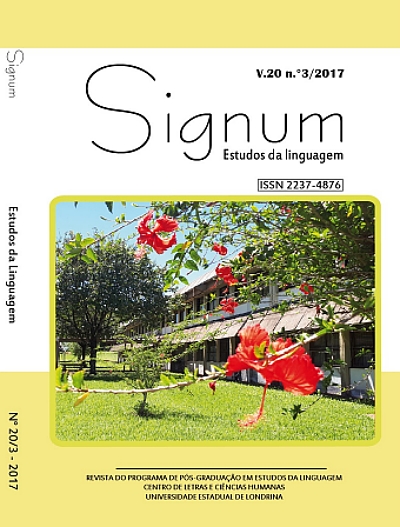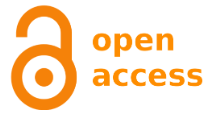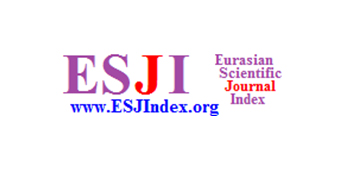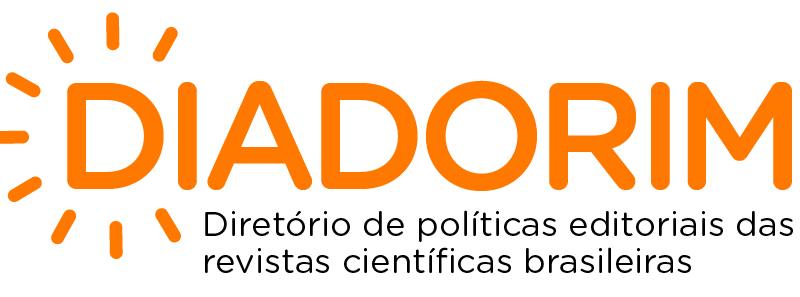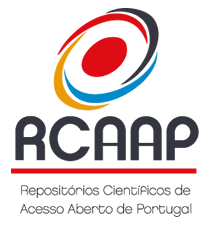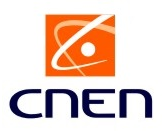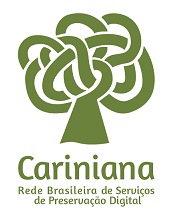O outro na produção de textos instrucionais de ensino médio
DOI:
https://doi.org/10.5433/2237-4876.2017v20n3p11Palavras-chave:
interlocutor, escrita, texto instrucionalResumo
Abstract: This article focuses on the role of interlocutor / other in written
productions of high school students, and its objective is to analyze the
manifestations of the interlocutor in instructional texts produced by students
from a private high school education in Paraná Northwest. The theoretical
anchorage that supports the analyzes and statements are the concepts
developed by the Bakhtin Circle and discussions of Brazilian researchers in
Applied Linguistics. Data were collected from a writing activity proposed
by the Portuguese teacher to 30 students in a multigrade class. Analyses were
done in view of four categories of interlocutor's manifestation: i) real
interlocutor; ii) virtual interlocutor; iii) internal interlocutor; iv) higher
interlocutor. The results of this study indicate that the interlocutor's categories
are marked in the texts, showing that interlocutor is a constitution element
of written. Another result points to the fact that the higher interlocutor
influences differently in the beginners' and experienced students texts in the
educational institution where the research was conducted. In the writing of
experienced students, its influence is related to the organization of the text,
lexical choice etc.
Downloads
Referências
Parábola, 2003.
BAKHTIN, M./VOLOCHINOV, V. N. Marxismo e filosofia da linguagem.
11. ed. São Paulo: Hucitec, 1992.
BAKHTIN, M. Estética da criação verbal. Tradução Paulo Bezerra. São
Paulo: Martins Fontes, 2003.
BERNINI, E. A. B.; MENEGASSI, R, J. Interlocução na produção de
cartas pessoais na sala de aula. Signum: Estudos da Linguagem, Londrina,
n. 16, v. 2, p. 17-38, dez. 2013. Disponível em: <http://bit.ly/2Bb9H9r>.
BRITTO, L. P. L. Em terra de surdos (um estudo sobre as condições de
produção de textos escolares). In: GERALDI, J. W. (Org.) O texto na sala
de aula. São Paulo: Ática, 2006. p. 117- 126.
COSTA, S. R. Dicionário de gêneros textuais. Belo Horizonte: Autêntica, 2008.
FRANZOI, R. C. Manifestações do interlocutor nas produções textuais: escritas no
ensino fundamental. 2009. Dissertação (Mestrado em Letras) -
Universidade Estadual de Maringá, Maringá.
GERALDI, J. W. Portos de passagem. São Paulo: Martins Fontes, 1995.
MENEGASSI, R. J. O interlocutor nas propostas de produção textual no
livro didático. Trabalhos em Linguística Aplicada, Campinas, n. 50, v. 1,
p. 169-187, jan./jun. 2011.
MENEGASSI, R. J.; FUZA, A. F. A finalidade da escrita no livro didático:
influências da imagem do interlocutor. Acta Scientiarum: Human and Social
Sciences, v. 28, n. 2, p. 155-165, 2006.
SANTOS, L. W.; FABIANI, S. J. S. Gêneros instrucionais nos livros
didáticos: análise e perspectivas. Revista de Letras, v. 1/2, p. 63-71, jan./dez.
2012.
SOBRAL, A. Do dialogismo ao gênero: as bases do pensamento do círculo de
Bakhtin. Campinas: Mercado de Letras, 2009.
TRAVAGLIA, L. C. A superestrutura dos textos injuntivos. In:
SEMINÁRIO DO GRUPO DE ESTUDOS LINGUÍSTICOS DO
ESTADO DE SÃO PAULO, 39., 1992, Jaú. Anais... v. 2. Jaú: Fundação
Educacional Dr. Raul Bauab, 1992. p. 1290-1297.
TRAVAGLIA, L. C. A caracterização de categorias de texto: tipos, gêneros
e espécies. Alfa, São Paulo, v. 51, n. 1, p. 39-79, 2007. Disponível em:
<http://bit.ly/2jxODTW>. Acesso em: 13 ago. 2014.
VOLOSHINOV, V. N./BAKHTIN, M. Discurso na vida e discursa na arte:
(sobre poética sociológica). Tradução Carlos Alberto Faraco e Cristóvão
Tezza. 1976 [1926]. (Circulação restrita).
Downloads
Publicado
Como Citar
Edição
Seção
Licença
Copyright (c) 2017 Signum: Estudos da Linguagem

Este trabalho está licenciado sob uma licença Creative Commons Attribution-NonCommercial-NoDerivatives 4.0 International License.
Signum: Estudos da linguagem, publica seus artigos licenciados sob a Licença Atribuição-NãoComercial-CompartilhaIgual 4.0 Internacional. Esta licença permite que terceiros façam download e compartilhem os trabalhos em qualquer meio ou formato, desde que atribuam o devido crédito de autoria, mas sem que possam alterá-los de nenhuma forma ou utilizá-los para fins comerciais. Se você remixar, transformar ou desenvolver o material, não poderá distribuir o material modificado.
